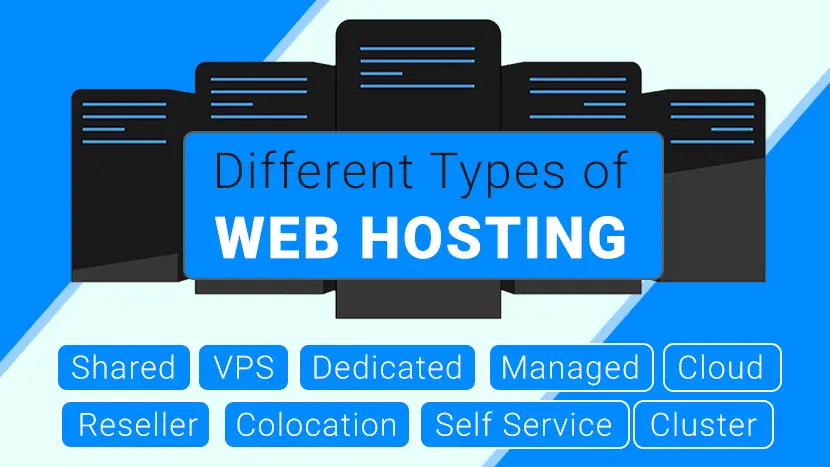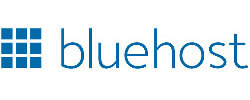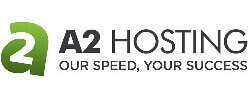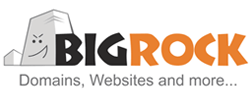10 Different Types of Web Hosting
Last updated on January 19, 2025 by RGB Web Tech

There are different types of web hosting services. So, it can be very difficult to figure out which type of web hosting you need or choose.
In the article, I hope to teach you everything you need to know about web hosting. There are many kinds of web hosting. I can easily see how people get confused so quickly. I will cover the following:
- Shared Hosting — Shared hosting is the most cost-effective plan for entry-level websites.
- VPS Hosting — VPS hosting is for websites that have outgrown shared hosting.
- WordPress Hosting — WordPress hosting optimized for WordPress sites.
- Dedicated Hosting — Dedicated hosting is Enterprise-level servers for large websites.
- Cloud Hosting — Cloud hosting is best for websites that are growing rapidly.
- Reseller Hosting — Reseller hosting is for agencies, web developers, and web designers.
- Managed Hosting — Managed hosting is an IT hosting model in which the client leases servers or cloud computing resources.
- Colocation Hosting — Colocation hosting is where you rent space for your IT hardware at a 3rd party provider’s data center facility.
- Self Service Hosting — Self hosting is a form of running your own website or application by setting up a server and network yourself.
- Cluster Hosting — A Cluster hosting is a host that is configured to take over the role of another host server within a cluster.
Shared Hosting
Shared hosting is a type of web hosting where a single physical server hosts multiple sites. Many users utilize the resources on a single server, which keeps the costs low. Users each get a section of a server in which they can host their website files. Shared servers can host hundreds of users. Each customer using the shared hosting platform’s server has access to features like databases, monthly traffic, disk space, email accounts, FTP accounts and other add-ons offered by the host. System resources are shared on-demand by customers on the server, and each gets a percentage of everything from RAM and CPU, and other elements such as the single MySQL server, Apache server, and mail server.
VPS Hosting
VPS is short for a Virtual Private Server. VPS hosting is one of the most popular hosting services you can choose for your website. It uses virtualization technology to provide you with dedicated (private) resources on a server with multiple users.
It’s a more secure and stable solution than shared hosting where you don’t get a dedicated server space. However, it’s smaller-scale and cheaper than renting an entire server.
VPS hosting is usually chosen by website owners who have medium-level traffic that exceeds the limits of shared hosting plans but still don’t need the resources of a dedicated server.
WordPress Hosting
WordPress hosting is just hosting that has been optimized to better meet WordPress’ performance and security needs. It also typically includes one-click WordPress installs to make it easy to get started with WordPress. And some WordPress hosts will even automatically update your WordPress software as needed.
Dedicated Hosting
Dedicated hosting is a term used to describe web hosting packages that provide a dedicated server with dedicated resources to a single client. Dedicated hosting plans are ideal for WordPress websites with a very large number of visitors. Many WordPress hosting service providers offer Dedicated Hosting plans along with shared and VPS hosting plans.
Cloud Hosting
Cloud hosting is a type of web hosting which uses multiple different servers to balance the load and maximize uptime. Instead of using a single server, your website can tap into a “cluster” that uses resources from a centralized pool. This means that even if one server fails, another kicks in to keep everything running.
Visualize the cloud as a web of different computers which are all interconnected. As more machines are hooked up to the network, more resources are added to the overall cloud.
With cloud hosting, you get a part of the so-called cloud cluster. As opposed to traditional web hosting, where you get a certain amount of space from a single server.
The main benefits of cloud hosting include a major focus on uptime, isolated resources, easy scaling, and a dedicated IP address.
Reseller Hosting
Reseller web hosting is an option that involves one company (a hosting provider) renting hard drive space and bandwidth to another company (small-midsize business), who then rents the space to third parties (entrepreneurs-small business). Simply put, reseller hosting is the ability to provide hosting to your own clients as if you yourself were the web hosting company. This is typical for aspiring entrepreneurs who want to start their own web hosting firm or for current web developers and designers who desire to add additional services to their brand.
Managed Hosting
Managed dedicated hosting is an IT service model where a customer leases dedicated hardware from a managed hosting services provider. This solution includes servers, storage, and networking hardware. Because you aren’t sharing these resources with anyone else, it’s referred to as a single-tenant solution.
When you choose managed dedicated hosting, you get to choose your operating system while your service provider handles the administration, management, and support of your solution. And because you’re not sharing any of these resources with another tenant, you have access to the full performance capabilities of the hardware you’re leasing.
Colocation Hosting
Colocation hosting is a type of service a data center offers, in which it leases space and provides housing for servers. The clients own the servers and claim full authority over the hardware and software. However, the storage facility is responsible for maintaining a secure server environment.
Colocation services are not the same as cloud services. Colocation clients own hardware and lease space, with cloud services they do not have their hardware but lease it from the provider.
Colocation hosting should not be confused with managed (dedicated) services, as the second implies the data center also assumes management and maintenance control over the servers. With colocation hosting, the clients are the one who is responsible for supplying, maintaining, and managing their servers.
Self Service Hosting
Self-service web hosting is done completely on your own. This is the most advanced web hosting. You need to have a place to rent that stores your server. Then you’re responsible for the cooling, power, bandwidth, hardware, system administrator, backups, etc.
Cluster Hosting
Cluster hosting is sometimes confused with Cloud or Grid hosting. It is simply a group of servers that operate together and act as one “mega” server. The big difference between cluster hosting and cloud hosting is cluster hosting is over a smaller area. For instance, there could be a cluster of servers along the eastern coast of the United States.
Cluster hosts are typically billed on an hourly or monthly rate.
List of Popular Web Hosting Service Providers:
Read More : You can explore here 30+ Best Web Hosting Providers
Video - Best Web Hosting For Small Business
Affordable Website Hosting for your domainIf you found this article helpful, we encourage you to share it on your social media platforms—because sharing is caring! For more information about article submissions on our website, feel free to reach out to us via email.
Send an emailWritten by RGB Web Tech
Latest Technology Trends
Latest technology trends shaping the future, including AI advancements, blockchain innovation, 5G connectivity, IoT integration, and sustainable tech solutions. Explore breakthroughs in quantum computing, cybersecurity, augmented reality, and edge computing. Stay ahead with insights into transformative technologies driving innovation across industries and revolutionizing how we live, work, and connect.
Most Essential Elements of eCommerce Website
Last updated on January 19, 2025 by RGB Web Tech

Do you want to open a new online store or eCommerce website? It’s the right time to do so. The eCommerce world is growing with every passing day. People nowadays, especially Gen Z, prefer online shopping to buying things from brick-and-mortar stores. If you create an outstanding eCommerce website, you can take your business to the next level.
Here arises a question: Is it easy to develop, design, and successfully run an eCommerce website? Not at all, especially when you are new to the online world. You can hire professional developers for that purpose, but when you don’t know the most crucial elements of eCommerce websites, you may waste time, energy, and money.
Responsive web design is also crucial for business or eCommerce websites. Your website must be responsive to each device. Nowadays, people explore the internet and buy products using their mobile phones. That’s why you must always make your website mobile-friendly. If your website is not mobile-friendly, you may lose a lot of leads. Hiring a Magento enterprise developer can help ensure that your site is optimized for all devices, enhancing user experience and retention.
But don’t worry at all. This article will help you learn about the essential elements of online stores that can help you create an extraordinary website that can help you generate more sales than your physical outlet.
Here they are!
1. Eye-catching and Detailed Product Pictures
Product photography is also very crucial when it comes to eCommerce websites. You must capture each picture carefully to perfectly showcase your products and help people know what it looks like. If you don’t know the art of product photography, you can hire professional photographers and designers.
Eye-catching product images can enhance your sales and convert leads into conversions. If you compromise on product photography, you may not get a lot of orders. Therefore, there is no margin of error in product photography.
2. Unique and Relevant Content
Unique and relevant textual content is also essential for your website. Content helps people learn more about each product and your brand values. You must add content to every page which can help you inform people about your products.
However, that content must be unique and not copied from any other online platform.
To know the originality of your content, you should always check the content for plagiarism using an authentic and dependable online plagiarism checker. That plagiarism detector can help you know which sentences or phrases are already published on other websites.
Moreover, they can also help you see the percentage of original and plagiarized content. It can help you decide whether to paraphrase the content or publish it as it is.
3. Clear Call to Action
A clear call to action is more critical on eCommerce websites than any other. That’s why you must add clear calls to action wherever needed. That’s how you can help people take the next step and purchase your products.
CTAs can significantly enhance conversions and help you reduce bounce rates as well. That’s why every eCommerce store adds CTAs to their websites to help people know what to do next. They also play a catalyst role in your website’s success. So, whatever the case is, never forget to add CTAs.
4. Price Filters
It can help if you add price filters to your website. Almost all websites add this feature to help consumers find the right products according to their budget. Most eCommerce stores offer tons of products with varying price ranges.
Consumers don’t want to see products they cannot afford. To satisfy those consumers’ nee ds, brand owners must add price filters to their websites.
Price and other filters help consumers quickly explore all the products in their range. That’s why you should always add all the filters and offer a great user experience.
5. Responsive Design
Responsive web design is also crucial for business or eCommerce websites. Your website must be responsive to each device. Nowadays, people explore the internet and buy products using their mobile phones. That’s why you must always make your website mobile-friendly. If your website is not mobile-friendly, you may lose a lot of leads.
Responsive web design can also improve your SEO score and help you get a lot of traffic regularly. Search engines usually don’t show consumers websites with unresponsive web designs. So, you should always take care of responsiveness to help your website get a better ranking and enhanced traffic.
6. Search Functionality
In order to help users quickly find their desired products, you must add the search functionality to your website. This functionality can help users visit the website and search for a specific product they have seen somewhere. Moreover, it can help them find the correct categories and explore all the products in that particular category.
Users usually don’t like websites without search functionality as they don’t find the website easy to use. That’s why almost every eCommerce expert suggests new brands add this functionality.
7. Secure Payment Options
Payment security is another essential element that can help you build trust and generate more sales. Many scammers have entered the eCommerce world that doesn’t provide secure payment options, and they fraud their consumers. It has also dented the entire online market, and now consumers are more cautious regarding payment options.
People will start trusting and purchasing items from your brand if you provide reliable payment options. On the other hand, if you use unreliable and insecure payment options, you may not win consumers’ trust and get orders.
8. Review and Rating Options
You should also add review and rating options to your website so that every user can give reviews about your products and help new buyers know how great your products are. Most people like reading reviews and checking ratings before making the final purchase decision. When they find great reviews on your website, they tend to buy the products from your website.
However, you must always provide extraordinary products and services to your customers to get better reviews. That’s how you can encourage them to open your website and give positive feedback that can skyrocket your sales and help you generate a lot of revenue.
9. User Friendly Interface
One of the most crucial elements of every eCommerce website is a user-friendly interface that assists users in quickly exploring your website and finding the products they want to buy. Nowadays, people prefer easy-to-use websites with excellent user experience.
If you have a great user interface, the visitors will stay on your website longer and can quickly explore all the products they want to buy. It can also leave a great first impression on every visitor, and they will also love to stay on your website and recommend others.
If you found this article helpful, we encourage you to share it on your social media platforms—because sharing is caring! For more information about article submissions on our website, feel free to reach out to us via email.
Send an emailWritten by RGB Web Tech
Latest Technology Trends
Latest technology trends shaping the future, including AI advancements, blockchain innovation, 5G connectivity, IoT integration, and sustainable tech solutions. Explore breakthroughs in quantum computing, cybersecurity, augmented reality, and edge computing. Stay ahead with insights into transformative technologies driving innovation across industries and revolutionizing how we live, work, and connect.





